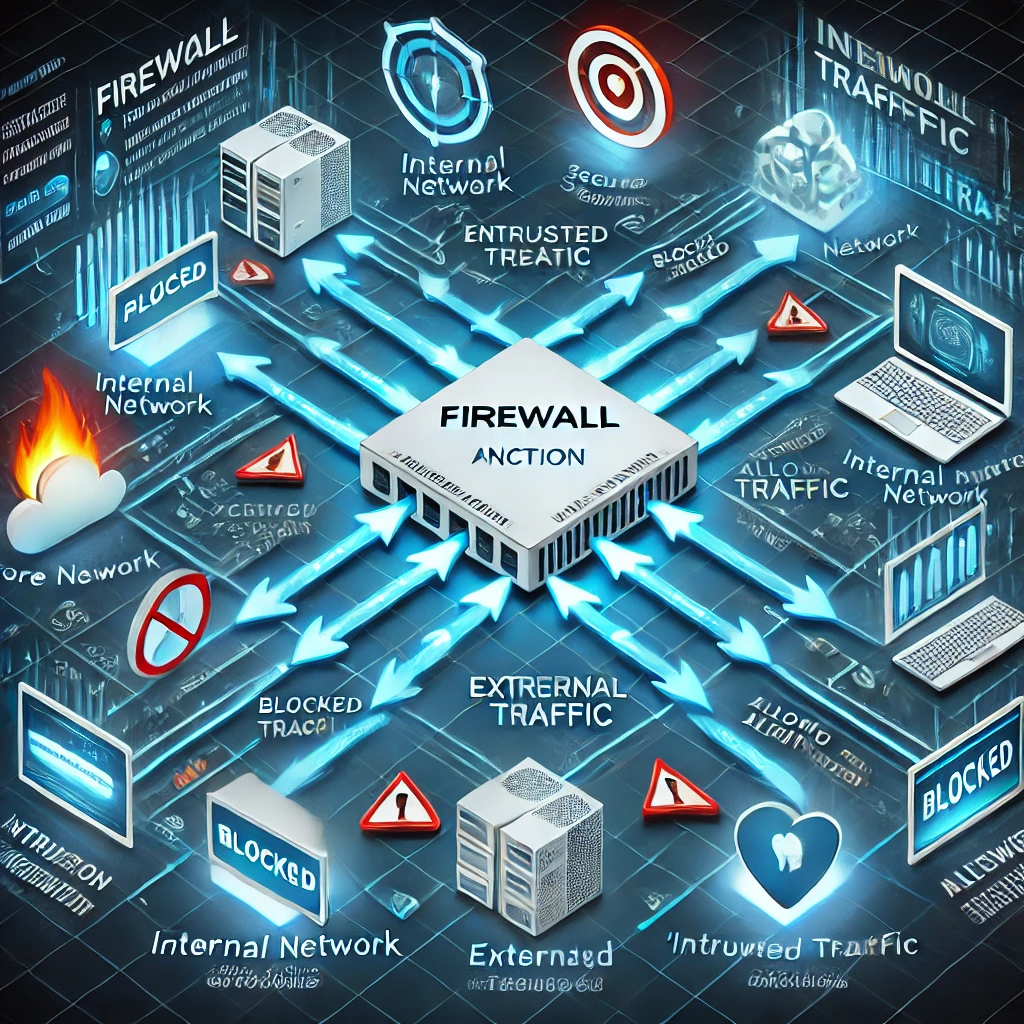In today’s digital landscape, cybersecurity is more critical than ever. One of the most fundamental and essential security measures is a firewall—a barrier that protects networks from unauthorized access, malicious traffic, and cyber threats. Whether you’re a business or an individual, firewalls play a crucial role in securing your data and digital assets.
In this post, we’ll explore what firewalls are, how they work, their types, and why they’re essential for cybersecurity.
🔍 What is a Firewall?
A firewall is a network security device or software that monitors and controls incoming and outgoing traffic based on predefined security rules. It acts as a filter between trusted internal networks and untrusted external sources (e.g., the internet), allowing legitimate traffic while blocking harmful data.
Firewalls are the first line of defense against cyber threats such as:
✅ Unauthorized access
✅ Malware and ransomware
✅ Denial-of-Service (DoS) attacks
✅ Phishing attempts
✅ Data breaches
⚙️ How Firewalls Work
Firewalls analyze data packets based on specific security rules and either allow or block them. They use packet filtering, stateful inspection, and deep packet inspection (DPI) to identify and stop potential threats.
1️⃣ Packet Filtering: Examines packets and blocks or allows them based on IP addresses, ports, or protocols.
2️⃣ Stateful Inspection: Tracks the state of active connections and makes decisions based on the context of traffic.
3️⃣ Deep Packet Inspection (DPI): Analyzes packet content for malware, intrusion attempts, and protocol violations.
🏗️ Types of Firewalls
1️⃣ Hardware Firewalls
- Physical devices placed between a network and the internet.
- Often used in businesses for enterprise-level protection.
- Example: Cisco ASA, Fortinet FortiGate, Palo Alto Networks Firewalls.
2️⃣ Software Firewalls
- Installed on individual devices (PCs, servers) to monitor traffic.
- Provides personalized security but relies on system resources.
- Example: Windows Defender Firewall, Norton, McAfee.
3️⃣ Cloud-Based Firewalls (Firewall-as-a-Service – FWaaS)
- Hosted in the cloud, securing traffic before it reaches the network.
- Scales easily for remote work and cloud applications.
- Example: Cloudflare, AWS Web Application Firewall (WAF), Azure Firewall.
4️⃣ Next-Generation Firewalls (NGFWs)
- Combines traditional firewall capabilities with intrusion prevention systems (IPS), threat intelligence, and deep packet inspection.
- Uses AI-driven security to detect advanced threats.
- Example: Palo Alto NGFW, Check Point, Fortinet NGFW.
🔄 Firewall Deployment Strategies
📌 Perimeter Firewalls: Placed at the network boundary to filter traffic between external and internal networks.
📌 Internal Firewalls: Protects internal segments within a network (e.g., between departments).
📌 Host-Based Firewalls: Installed on individual devices to protect against local threats.
📌 Cloud Firewalls: Deployed to safeguard cloud applications and services.
🔐 Why Firewalls Are Essential for Cybersecurity
✔️ Prevents Unauthorized Access: Blocks hackers from infiltrating networks.
✔️ Enhances Data Protection: Protects sensitive data from breaches.
✔️ Filters Malicious Traffic: Stops malware, ransomware, and phishing attempts.
✔️ Improves Network Performance: Reduces unnecessary traffic, ensuring efficient bandwidth usage.
✔️ Regulatory Compliance: Helps businesses meet security standards like GDPR, HIPAA, and PCI-DSS.
📈 Best Practices for Firewall Security
🔹 Regularly Update Firewall Rules – Keep security policies up to date.
🔹 Enable Intrusion Detection & Prevention (IDS/IPS) – Detects and blocks malicious activities.
🔹 Implement a Zero Trust Model – Assume no traffic is trusted by default.
🔹 Monitor and Log Traffic – Use logging tools for real-time security insights.
🔹 Use Multi-Layered Security – Combine firewalls with antivirus, VPNs, and endpoint protection.
🎯 Final Thoughts
Firewalls are a critical component of cybersecurity, helping organizations and individuals prevent cyber threats, secure data, and maintain network integrity. As cyber threats continue to evolve, adopting next-generation firewalls and cloud-based security solutions will be key to staying protected.
Want to learn more about network security? Follow Packet-Switched.com for expert insights on firewalls, cybersecurity trends, and IT best practices! 🚀




In conclusion, firewalls serve as the first line of defense in cybersecurity, protecting networks from unauthorized access, malicious attacks, and harmful traffic. By monitoring and controlling incoming and outgoing data, firewalls help safeguard sensitive information and maintain system integrity. While firewalls are essential, they should be used in conjunction with other security measures to ensure comprehensive protection against evolving cyber threats.
In today’s ever-evolving digital landscape, firewalls serve as the first line of defense in cybersecurity, protecting networks from unauthorized access, malware, and other cyber threats. By filtering incoming and outgoing traffic based on predefined security rules, firewalls help safeguard sensitive data and maintain system integrity. As cyber threats continue to grow in complexity, implementing a robust firewall solution remains essential for individuals and businesses alike, ensuring a secure and resilient IT environment.